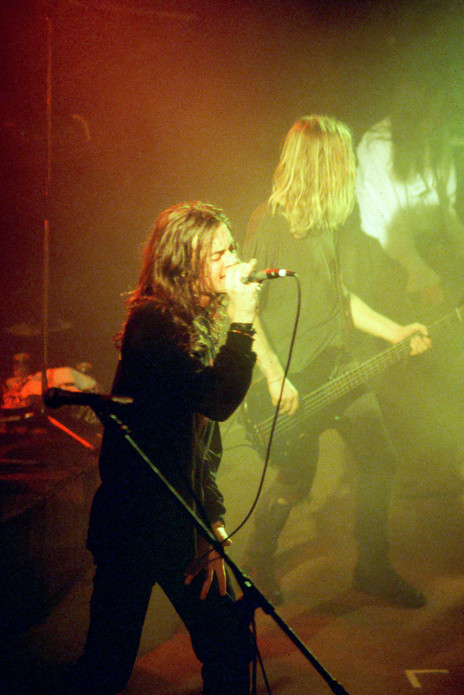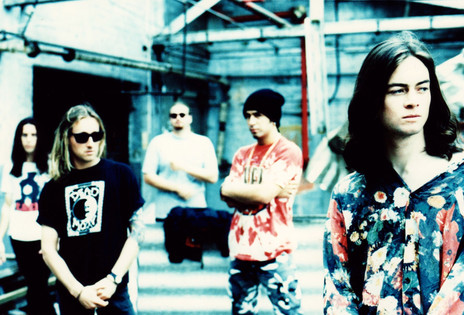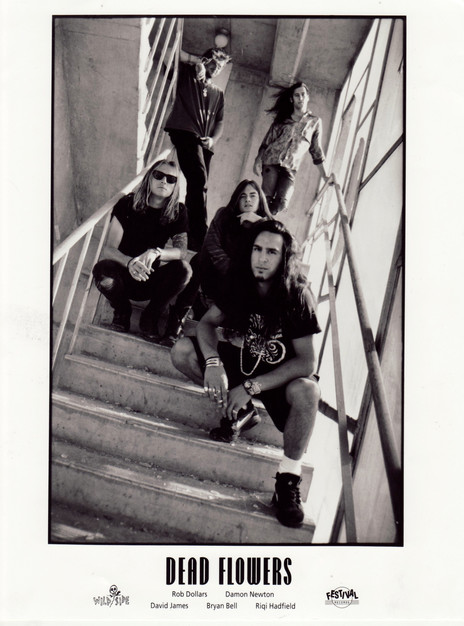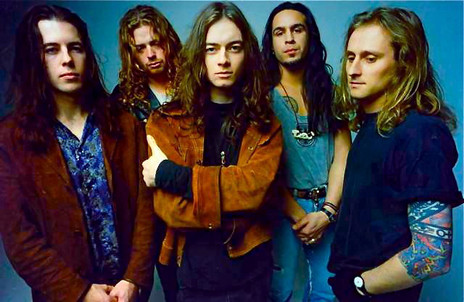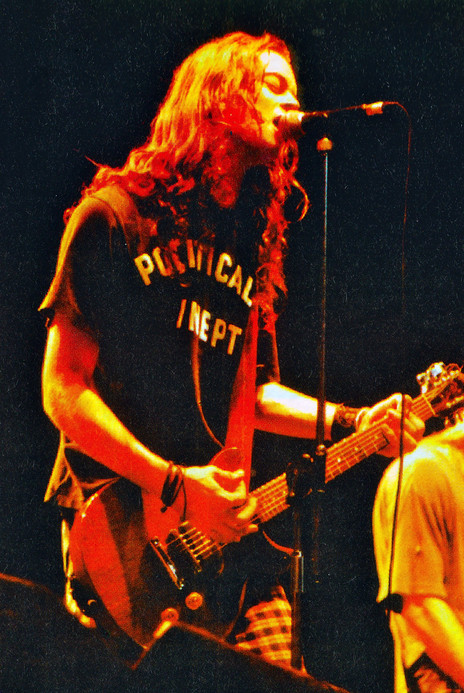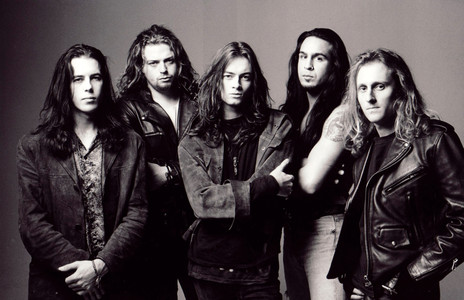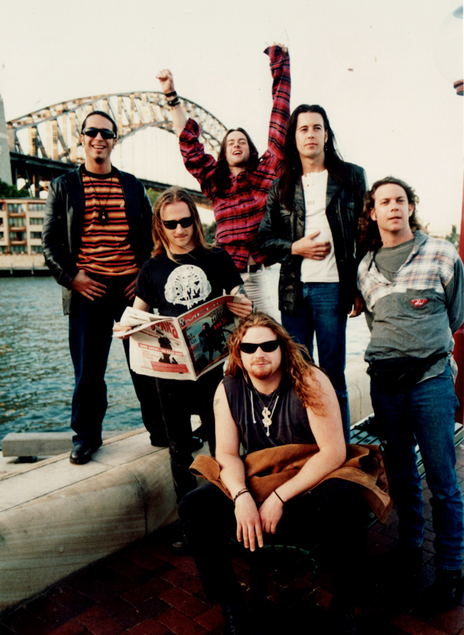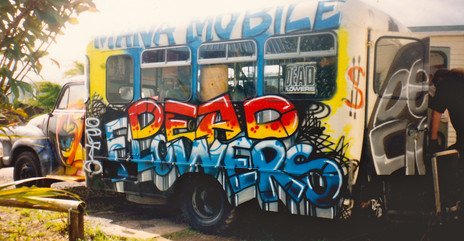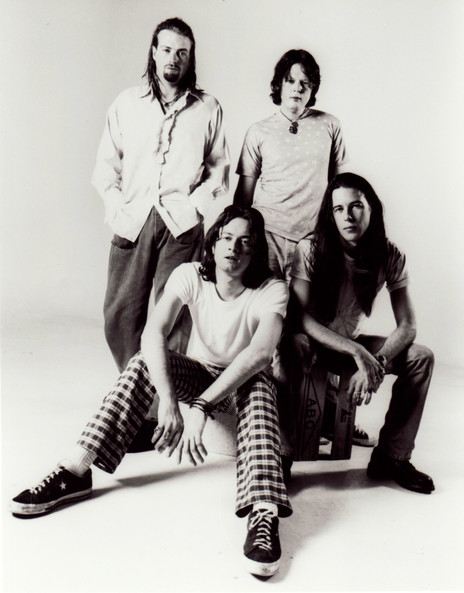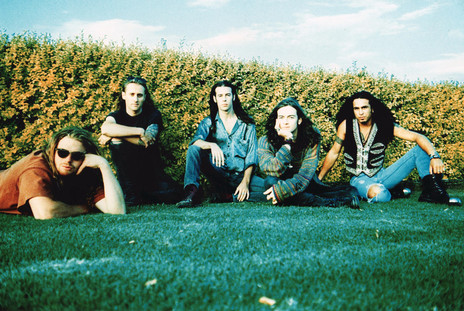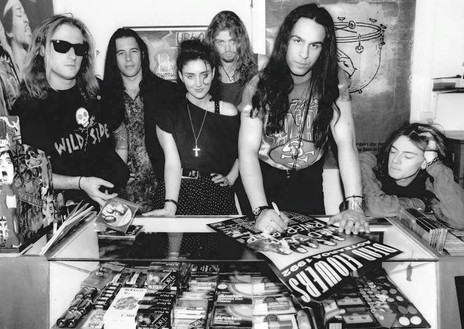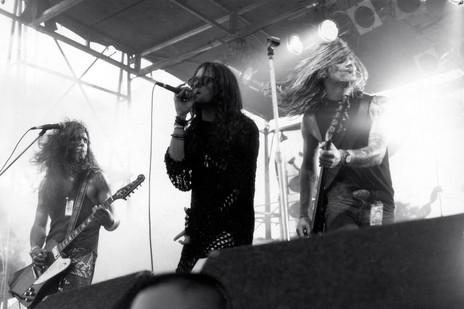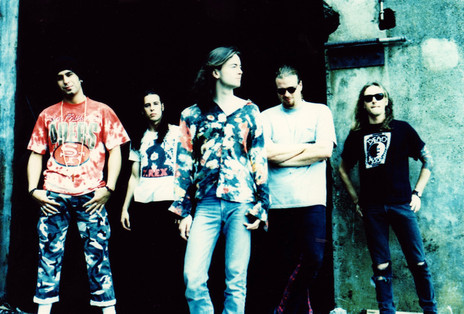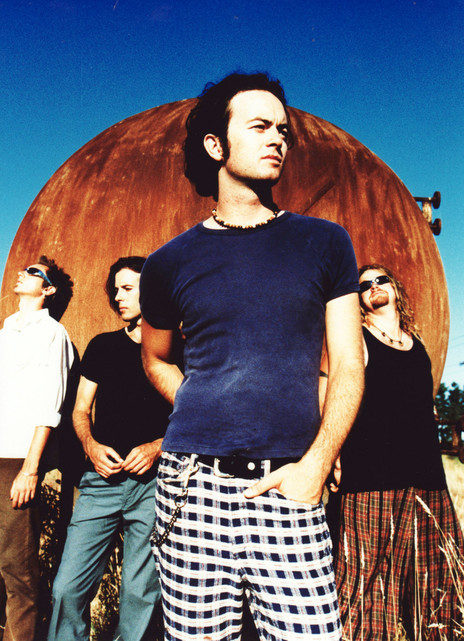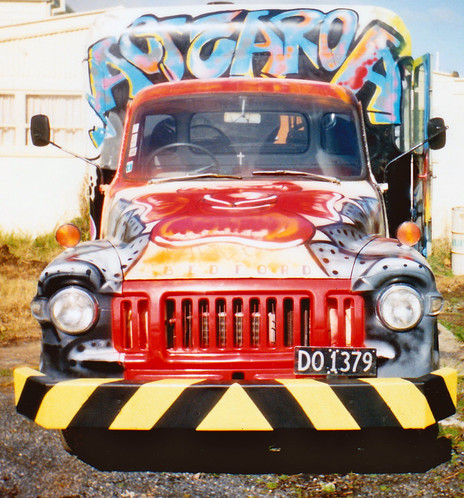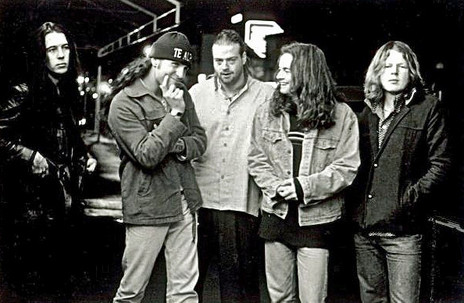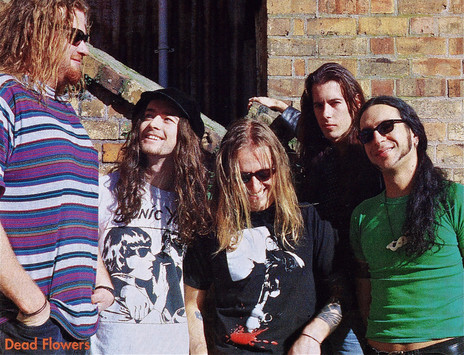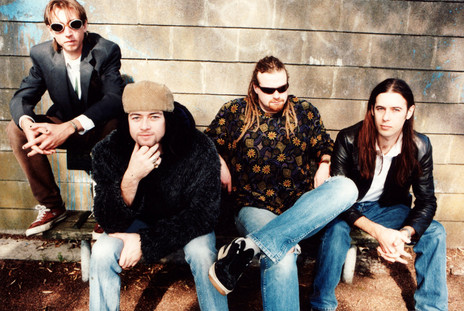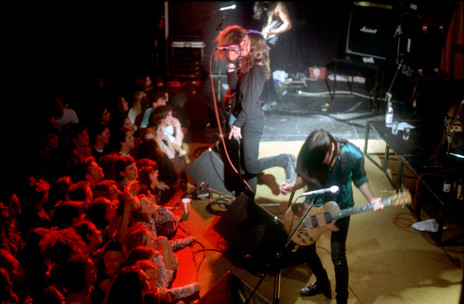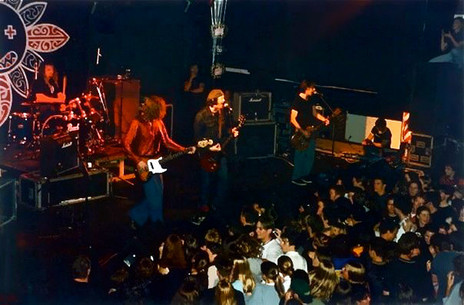At 17, Bell advertised for a second guitar player. “Reuben Chapple turned up. He had a band called Glam Savages in Australia and the remaining members ended up becoming Candy Harlots, who did well in Australia. Before that, we didn’t really know what we were doing – ‘are we going to be a covers or original band?’ – then he came along with 20 original songs already written. So we formed Kiss Me Deadly and played venues like Liberty Stage and Rising Sun, alongside all these hardcore bands including The Warners and The Rattlesnakes.”
US glam metal was hugely popular and a local scene had developed around Push Push and Nine Livez who went all out with lights, staging and even fireworks onstage. Bell soon decided their shows looked a lot more fun. “At the shitty bars we were playing, there’d be fights breaking out and they were always getting raided by the police. I didn’t know about the Powerstation, until we went to see Whiskey and Lace and Push Push play. They’d have these five bands for five dollars gigs on Friday or Saturday night and there’d be 500 people there. We were into that glam rock stuff, so it was see you later to Kiss Me Deadly and we did Bad Boy Lollipop instead. I never named that band by the way! It was a great scene for a few years, playing to a lot of people. You didn’t make any money but you could live off the dole, I’d pay $40 rent, dine on $1 Georgie Pies and still have enough left to buy drinks.”
Bad Boy Lollipop led Bell to play alongside guitarist Damon Newton and Rob Dollars (Rob Colbeck), who had previously drummed for garage rock group Psycho Daisies. It came to a sudden end when Simon Williams announced he was moving to America. Bell and Newton decided to form Dead Flowers and the first person they approached was guitar virtuoso, Riqi Hadfield, whose father Rangi had played in the Maori Volcanics and toured the world as a member of Variety Artists’ Club.
They moved quickly to establish themselves in Auckland through live shows and took early demos to Murray Cammick from Wildside.
“Riqi’s band, My World Crazy, broke up at the same time. I’d always liked his playing in his previous band, Whiskey and Lace – we were on such a lower level than that band, they were the shit ... Dave James owned Corner Records and Damon was working there. Dave hadn’t ever touched a guitar or bass, but he knew we were looking for a bass player, so he bought all the gear and just practised really hard until he got in. Then we added Rob Dollars. Dave hated all that glam rock stuff. Dressing up like a girl was about getting a girl back then, it wasn’t much about the music.”
They moved quickly to establish themselves in Auckland through live shows and took early demos to Murray Cammick from Wildside. Eventually their demo of ‘Lisa’ convinced him they had crossover potential and he put them in the studio with Terry Moore (formerly of The Chills). ‘Lisa’ hit No.27 and the band followed it up with a 24-date tour of the country in October 1992, travelling in an old school bus purchased by Dave James, who had picked up managerial duties.
“Not a lot of bands were doing such extensive New Zealand tours back then. So in every small town, you’d be in the newspaper and it was quite easy to create interest. It helped that Dave hired John Baker to organise the first big national tour. We’d take the PA with us, so we’d have to set up the PA, then we’d play, then we’d have to pack down. It was a slog but so much fun.”
Soon after, they headed to Mountain Rock studios to record with Phil Rudd (ex-AC/DC drummer), which Bell found enjoyable: “Phil was nothing like the guy you see on the news now. He was super cool the whole time we were there and he shared numerous stories about Bon Scott in the downtime. He was a little guy but a beast behind the kit, he was the only guy to tell Rob Dollars to hit the drums harder.”
Skin Of A Stone (1993) went to No.24 on the album charts, led by catchy singles ‘Be Someone’ and ‘Plastic’. Bell was overjoyed when their success saw them picked as the support act for Guns N’ Roses at Mt Smart Supertop on Waitangi Day, 1993.
“We’d only been together eight months before getting that gig. I didn’t sleep much the whole week. I thought we went down really well and the crowd was massive. It was Axl’s birthday, so they brought a cake onstage during their show. We saw it backstage after show and thought, we’ll have that. We lived off that cake for a month back at the band flat. At the after-party, there was us, Skid Row and Guns N’ Roses and hardly anyone else. Axl came down, flanked by a bodyguard. I remember thinking, it’s his birthday, he’s one of the most famous people on the planet, and none of his bandmates want to talk to him. All the money, all the fame in the world and he’s sitting with his bodyguard, talking to no one.”
The following June, all of the band’s gear was stolen from their practice room. A successful benefit gig was organised at the Powerstation, billed as “Dead Aid”. The proceeds went a long way toward getting new guitars and amps, while the band borrowed any other gear needed for an upcoming recording session. Wildside’s distribution deal with Festival Records meant the band was also able to make early inroads in Australia; Bell went over for a promotional visit first, which was followed by a tour.
“We had a 14-hour drive from Sydney to Brisbane and four hours into it, Rob realises he’s left his cymbals back in Sydney. So this 14-hour trip turned into a 20-hour trip. It looked like the same road the whole way. Nothing to see, We arrived at 2am and had to find some accommodation, then play the gig the next day.”
In Brisbane, they played in front of 4000 people at a concert put on by radio station 4ZZZ. Back home, even better opportunities were opening up – they toured the country with The Exponents and played the first Big Day Out in 1994. The arrival of Max TV in October 1993 also provided a boost for the band: they were shoo-ins for NZ On Air funding, so could easily do five videos per album and get airplay for them.
Their second album, Sweetfish (1994), was preceded by two charting singles, which propelled it into the Top 40 in August.
Their second album, Sweetfish (1994), was preceded by two charting singles (‘Watch Her Play’ reached No.40 and ‘Home’ reached No.11), which propelled it into the Top 40 in August. The album showed the band tightening up their approach: while the first album had been filled with songs that meandered past five minutes, the follow-up was packed with punchy three-minute numbers. Damon Newton’s ‘What Do You Take Me For’ was over in 90 seconds and sounded more like Motorhead.
The band then undertook their most ambitious tour yet, joining Nothing At All! for 40 shows across New Zealand. At one show in Greymouth, Riqi noticed a dozen skinheads milling around in the venue and decided to write “brown power” across his chest. The skinheads’ odd response was for one of them to down his trousers while another lit a piece of paper that he’d stuck between his butt cheeks.
Bell was bemused: “Riqi writing Brown Power across his chest still strikes me as one of the most rock’n’roll things I’ve seen. I thought we were going to get our heads kicked in because there were 14 of them and only five of us. After the show, we didn’t realise that we’d left our sound guy at the venue. He thought the skinheads might come back and do him over, so he slept in a road case and locked himself in the truck.”
Over their first two years, the band released 40 songs (including B-sides) and toured heavily, but their work rate stirred friction within the band. Dave James decided to leave, playing his last show at the Big Day Out in 1995. Bell was sympathetic. “It could be quite heated. Big personalities. Different band members almost came to blows a few times. Egos clashing maybe … the idiosyncrasies of other people just bug you when you’re tired and we were doing a lot of touring.”
Replacing James was Aaron “Captain” Carson, a 95bFM DJ and member of garage rockers The Larry Normans. One of Carson’s early shows with Dead Flowers was supporting Pearl Jam. Bell recalls a surprise interruption while they were waiting to play. “This guy in a straw cowboy hat cycled up between us and we thought, ‘this guy’s got some balls.’ He said, ‘I heard you at soundcheck and you were really good.’ It turned out it was Eddie Vedder. So we talked to him for a bit and then he cycled off, outside Mt Smart stadium, where all the fans were coming in unaware of Eddie cycling around them.”
Airplay on Max TV had continued to help the band reach across the gulf between the hard rock audience and indie music crowd, with songs like ‘Same Same’ showing the band’s melancholic side (it was released an EP in 1995). There was growing tension about what direction the band should go in next. When it came to record their third album, Hadfield left the band and they carried on as a four-piece. Demos were recorded with Carson on bass and a studio booked in Australia, but a few weeks before they left he took a job at Festival Records and was no longer available. Bell brought on board Darryn Paterson-Harkness, whom he knew from his time with alt-rock band Braintree back at the Powerstation days.
The first sessions for the album took place at Darling Harbour in Sydney in mid-1996, followed by sessions at Revolver Studios in Auckland. Bell found the latter sessions especially enjoyable, due to input of Eddie Rayner, former member of Split Enz and Crowded House.
“That was the first time we had a producer and I actually understood what a producer does. He’d go to Neil Finn’s place and come back with these weird instruments I’d never seen before, then tell me to try recording something with them. That really got the creative juices going. And he was really big on only doing one or two takes. There was no way he’d let you take two hours on a part. It really worked I think. He helped me stand back from the songs and get a bit more objective about them.”
The result was the self-titled album, Dead Flowers (1998). Previous to this, writing music for the group had been split between Bell, Newton, and Hadfield, with Bell writing lyrics over the top. But with Hadfield gone and Newton putting his creative ideas into his side project, Lodger, Bell was in the driver’s seat. His love of Britpop led him in a more poppy direction and the album was heavy with potential singles. ‘Ain’t It The Truth’ was a straightforward rocker, ‘I Don’t See Anyone At All’ was an acoustic-driven pop tune, and ‘Might As Well Get Used To It’ was a moody number, with off-kilter processed drums, rhythmic piano, and short flourishes of echo-y guitar.
Lead single, ‘You Drink The Water, I’ll Drink The Wine’, was one of Bell’s most evocative pieces and started with a wry line about drinking your sorrows away: ‘It all started around $12.99 / My taste grew cheaper down to $6.95 …” On the surface the song seems to be a dispute between a hard-living guy and his more clean cut girlfriend, but Bell now admits that the inspiration was a little closer to home.
“My dad thought being a muso was ridiculous idea, I remember calling him from Airforce Studios and telling him, ‘I’ve been signed, I’m mixing my first album.’ I was thinking this would validate the decision that I’d made. But my dad’s response was, ‘oh Bryan, you’ll be dead by the age of 25 from a marijuana overdose’ ... There’s no point arguing with someone who believes that’s even possible. That’s what that song is referring to.”
The most enduring song on the album turned out to be ‘I Wanna Know’.
The most enduring song on the album turned out to be ‘I Wanna Know’, even featuring on a high profile NPC television ad in recent years. Bell now admits he had initially considered dropping it from the album. “I thought it was too obvious. And lyrically it’s about nothing really ... it’s just vowel sounds that sound good together and ambiguous enough to get away with it. I do like writing good lyrics, but the most important thing to me is the music and a killer melody. I always found it more effective to write words to fit a finalised melody rather than the other way around.”
New radio stations Channel Z and The Rock provided even more avenues for airplay. However, behind the scenes Bell found the band had placed themselves in an awkward position.
“The album cost $70,000, which is a lot of money. The label was worried about how much to spend on marketing so they could recoup. We’d just done a tour with the feelers and the head of their label, Warner, told us, ‘we want to do your album, because we don’t think BMG will do much with it.’ So we said, ‘okay, sounds interesting.’ But when it came down to it, they weren’t willing to pay anywhere near enough for BMG [Wildside’s distributor] to sell it. That probably fucked off BMG because they thought we were being manipulative … so even though ‘I Wanna Know’ and ‘I Don’t See Anyone At All’ were the sixth and eighth most-played New Zealand songs that year on radio that year, the album never had the follow-up.”
The result was that Dead Flowers were more popular than ever, but their album only dipped into the tail end of the charts. Bell even had a sideline as a solo performer after he did a cover of a Jan Hellriegel song with a cellist at the APRA Silver Scroll Awards:
“The Eagles tour manager was there because the band were about to play in Auckland and he said, ‘get that guy to play support.’ It wasn’t my crowd at all. The best thing about it was that backstage the record label had set up this massive high-roller bar side-of-stage with a black tie bartender. But what they hadn’t realised was that Melissa Etheridge and the Eagles were all recovering alcoholics, so none of those cats went near this bar. So after I played, I just hung out there with the cellist and Damon, who was my guitar tech. Plus Michael Gudinski was there. Just the four of us getting hell pissed on expensive booze.”
Bell did similar support slots with Bob Dylan and Alanis Morrisette (at a special show in Aotea Square, after Dead Flowers had supported her throughout the country). Another sign of their success was that they were invited to play an ANZAC show in London with Mental As Anything, The Exponents, Greg Johnson and Dave McArtney. However, things began to go awry once the touring group got to Singapore and were informed by their English lawyer that the working visas still hadn’t come through and that they’d have to enter the country as tourists.
“I remember so vividly that there was a plane from Russia arriving in London at the same time and Damon, for whatever reason, decided to queue with them. Maybe the Customs were a bit gnarlier for them. None of us had noticed we were all under The Exponents as a booking group. So they asked him, ‘are you travelling by yourself?’ He said, ‘yeah.’ But it’s on the ticket that we’re all part of this 30-strong contingent. So they take him away and grill him for six hours ... they realise we haven’t done anything that wrong, but they put a red X on his passport and say, ‘you’ve got 48 hours and then you’re going home.’ The gig is still three days away. Plus the Exponents had to fly back to Belgium from London while the work visas were processed then fly back, so the gig wouldn’t be shut down.”
The band made the best of Newton’s time in London by shooting a video in the daytime (for ‘I Don’t See Anyone At All’) and spending all night at a pub lock-in.
“So it’s 7am, we hadn’t slept for 24 hours, we get in a black cab – Jordan Luck, me, Rob and Damon. There’s no one on the streets, then we turn a corner and two coppers flag us down. This is my first time in London, so I’d decided to see what cocaine was like. I had half of it left in my wallet. Damon had already had his passport taken away and we were all high and pissed. The coppers were looking at us, assuming we’d come from a rave so we would be carrying. One of them interviews the cab driver, while the other starts interviewing us. He asks all of us what we do – in that situation, you don’t want to say you’re a musician. Rob said he looks after kids, I said I reviewed video games and Damon made up another job. Then they get to Jordan and he’s just been on the beer, but it’s the only time I’ve heard him say an arrogant thing in my life. He said, ‘I’m a rock star!’ I thought we were fucked. There were 30 seconds of the copper staring at me, deciding whether he could be bothered getting us out of the cab and searching us. But finally he said, ‘ok, off you go.’”
The band continued to tour with new bass player, Rich Mixture (Shaft), who took over when Harkness moved to the UK. In 2000, they played a free show in front of 8,000 at Hagley Park in Christchurch and a final show at Opononi, but soon afterward they lost their practice room and Bell felt the band deflate around him. “We never really sat down and said ‘that’s it.’ But no one even got in touch to say, ‘shouldn’t we play some more shows?’”
Rob Dollars shifted his attention toward starting his own landscaping business, while Damon Newton became a sound technician at Aotea Centre. Riqi Hadfield eventually released his own album under the name Riqi Harawira (Sound Of The Long White Cloud, 2016), which showcased his ability to fuse influences from rock to hip hop to electronica.
Bryan Bell joined the Jordan Luck Band with Dave Gent (Exponents), Mark Bell (Blam Blam Blam) and Jay Foulkes (Peking Man), though in more recent years, it has changed to include Rich Mixture on bass, Beaver from The D4 on drums, and Joe Walsh on guitar. The group gave Bell another avenue for his songwriting and his talent for a hook is clearly on display on the band’s single, ‘Only If You’re Lonely’ (from Not Only But Also, 2017). Bell does admit he had higher hopes for the Dead Flowers’ final album, but he retains only fond memories of the group.
“To me, the last Dead Flowers album was easily our best and all the boxes were ticked. The recording of it, having Eddie Rayner on board, and the songs were there. But how many millions of rock and roll stories are there like that? The band was just about to go interstellar, but then it fell apart. Gimme a break! … My time in Dead Flowers is the only reason I got the gig with Jordan, it’s huge. We play summer tours, our own gigs and private and corporate shows. Plus I have a studio at home and I have clients, so I record them. If I hadn’t done Dead Flowers, then I wouldn’t be doing what I am now so it’s all good.”
